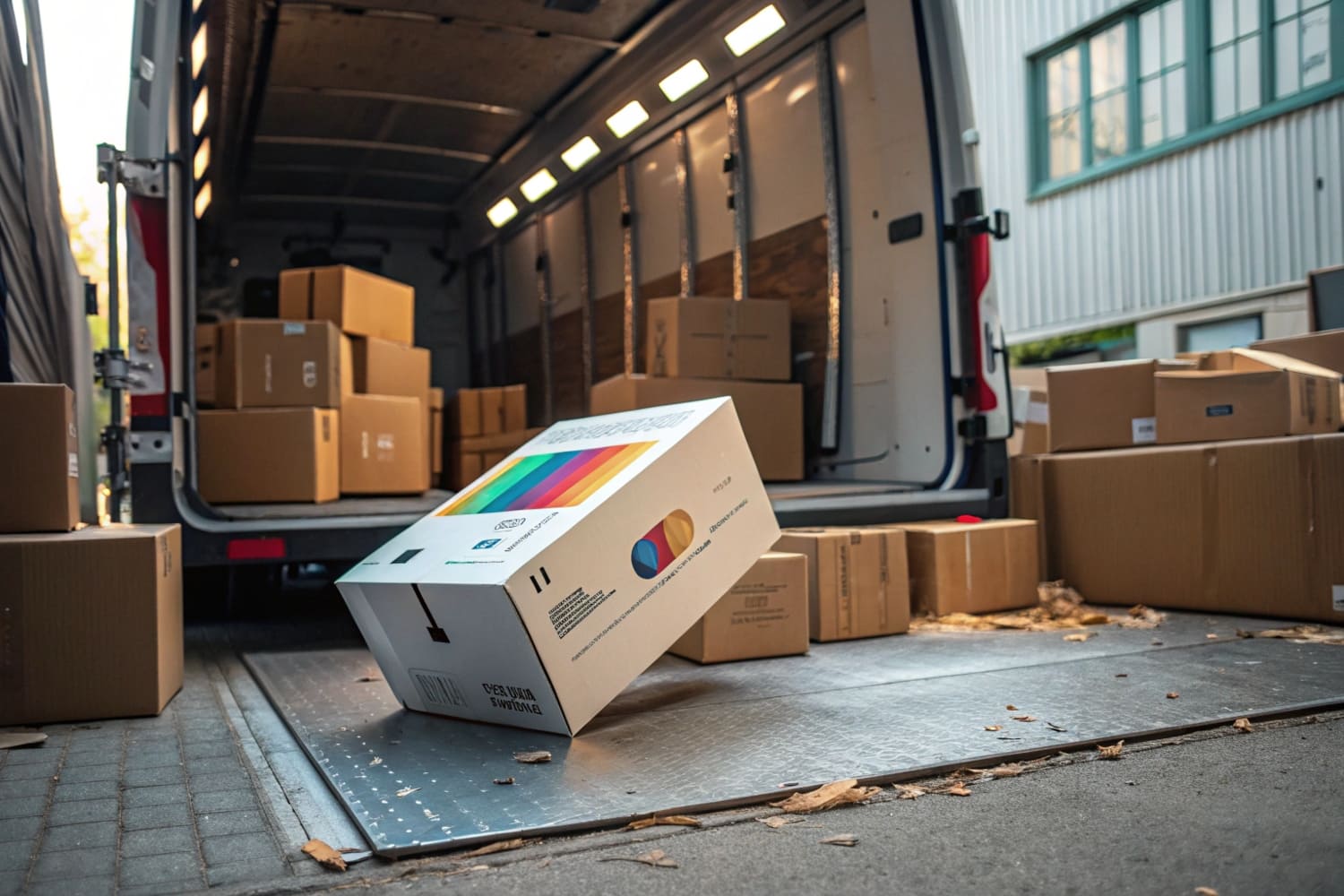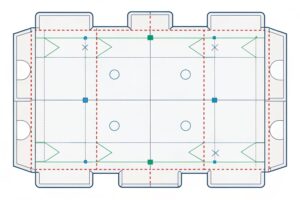I see brands waste money when they try to ship with the wrong box. Products arrive damaged. Buyers complain. Margins drop. I want to fix this problem fast.
Yes, you can ship in some display boxes if they use strong corrugated board, pass edge-crush and burst tests, and have secure closures. Most thin retail display cartons are not safe for parcel networks.
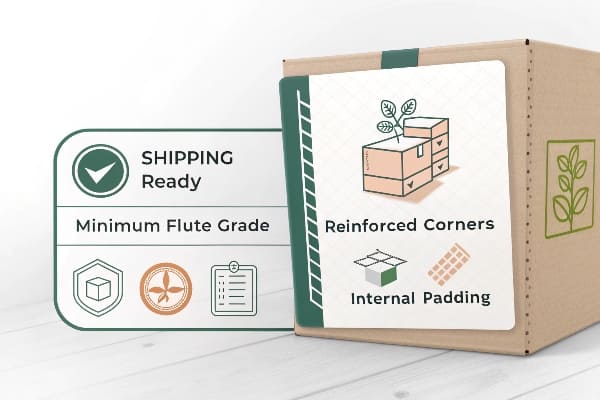
I will show what works, what fails, and why. I keep the rules simple. I add my factory lessons, test data, and buyer checklists. You can act today.
What kind of boxes are acceptable for shipping?
Many teams think any corrugated box will do. It looks rigid. It prints well. Then the seam pops in transit. The brand pays twice. I want you to avoid that.
Accept boxes that meet shipping-grade tests like ECT 32/44 or burst 200/275, use protective flutes, have taped or glued closures, and include inner cushions that match the product’s weight and drop risk.
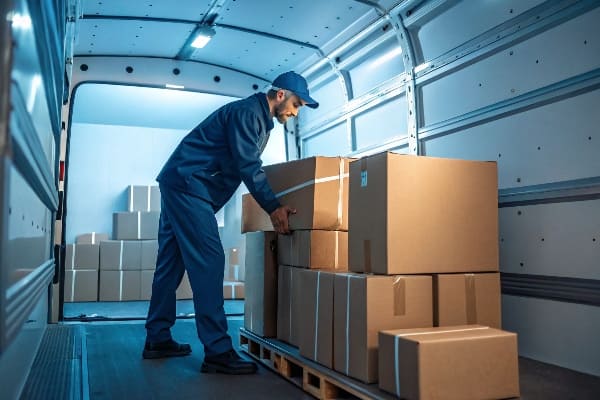
Shipping-grade standards made simple
I use clear rules for buyers and engineers. First, I size the box by weight and distribution risk. Parcel networks add compression, vibration, and drop shock. I choose board by flute and rating. Single-wall C or B flute handles light to medium loads. Double-wall BC carries heavier SKUs or stacked pallets. I request ECT or burst data from the mill and I verify with third-party tests in my factory. Then I lock closures. I prefer 48–60 mm pressure-sensitive tape or hot-melt glue on high-load seams. I add inside support: corner posts, trays, or molded pulp where needed. Finally, I run drop and compression tests on a packed sample. I learned this the hard way after a seasonal campaign failed due to seam tear. Since then, my acceptance table stays on my wall.
| Factor | Minimum Target | Why it matters |
|---|---|---|
| Board rating1 | ECT 32+ / Burst 200+ | Resists stacking and side crush |
| Flute | B/C for retail, BC for heavy | Balance print and strength |
| Closure2 | 48–60 mm tape or glue | Prevents seam failure |
| Cushion | Fit product and voids | Limits drop damage |
What are custom display boxes?
Many people mix up retail displays and shipping boxes. The shapes look similar. The print is bold. But the jobs differ. I want to give a clear view.
Custom display boxes are printed, structural cartons designed to present products in-store. They focus on branding, quick setup, and shopper impact, not parcel abuse. They can be reinforced for ship-to-shelf.
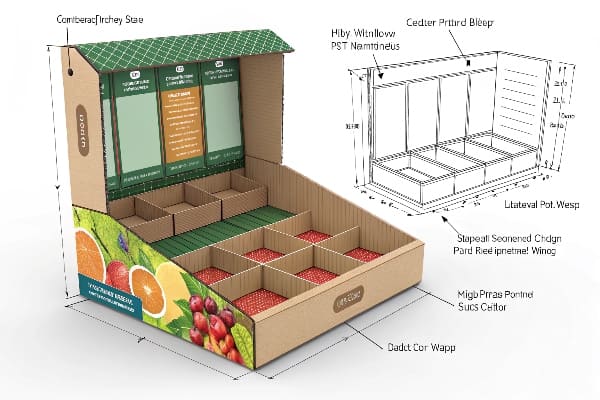
Where branding meets structure
I build custom display boxes3 for fast-moving goods, beauty, and outdoor gear. The goal is attention, not only protection. I use high-impact graphics, easy fold mechanisms, and PDQ trays that go from carton to shelf in minutes. In North America, buyers want consistent footprints and fast setup. In Asia-Pacific, growth is fast and budgets push for digital print and small batches. My team prototypes, then we run load and transit simulations. If a client wants “ship-in-own-container,” I adjust the board grade, add a tear strip, and reinforce corners. I include a header card with a die-line that survives pallet vibration. I also plan for sustainability4. I choose recycled content and water-based inks. This fits the push I see in Europe, where eco claims drive retail approvals. When done well, one box does two jobs: protect in transit and sell on shelf.
| Display Type | Primary Goal | Upgrade for Shipping |
|---|---|---|
| Counter PDQ | Impulse buy | Stronger tray walls, tear strip |
| Floor Standee | Visibility | Double-wall spine, base skids |
| Shelf Tray | Facing control | Tuck flaps + corner locks |
| Pallet Display | Speed to floor | Edge boards, strap channels |
Can Amazon boxes be reused for shipping?
People love to reuse boxes to save cost. I do too. But I only do it when it makes sense. I look at rating, wear, and residue before I say yes.
You can reuse an Amazon box if it is clean, undamaged, and strong enough for the new shipment’s weight, and if you remove old labels and barcodes to avoid misrouting.
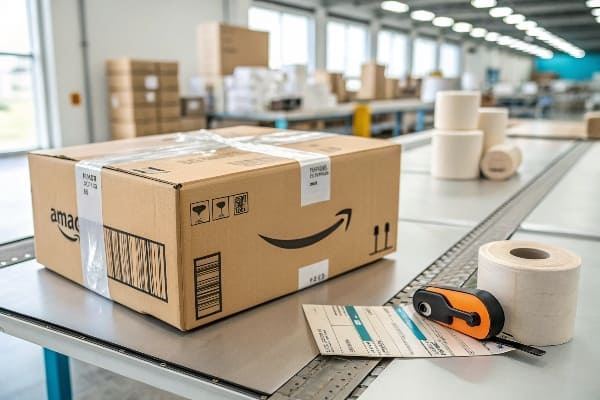
Reuse with standards, not luck
I like reuse5 because it cuts waste and cost. I follow a simple checklist. First, I check the box rating stamp. If there is no ECT or burst value, I assume light use only. Second, I inspect edges, corners, and flaps. Any crush, tears, or moisture stains lower strength fast. Third, I remove all old labels and hazard marks. Extra barcodes cause missorts. Fourth, I retape with fresh tape across the center and two H-seals. If the product is heavy or fragile, I stop and pick a fresh shipping-grade carton6. Reuse works best for light, non-fragile items and short zones. For a premium product launch, I never risk a weak carton. I prefer a new double-wall shipper and an inner PDQ. I learned this after a holiday push where reused boxes saved pennies but cost returns. Now I track reuse against damage rates and keep only what passes.
| Checkpoint | Pass Criteria | Action |
|---|---|---|
| Rating | ECT 32+/Burst 200+ | Accept for ≤10 kg |
| Condition | No crush, no tears | Reject if compromised |
| Labels | All removed or covered | Prevent missorts |
| Tape | Fresh H-seal | Lock flaps under load |
Can you ship something in a box with a logo on it?
Some shippers worry that logos cause issues. Others think logos invite theft. I use a simple rule. I match branding to risk, route, and carrier rules.
Yes, you can ship in a branded box if the carton meets strength standards and legal marks are correct; avoid sensitive graphics for high-theft items or routed deliveries left unattended.
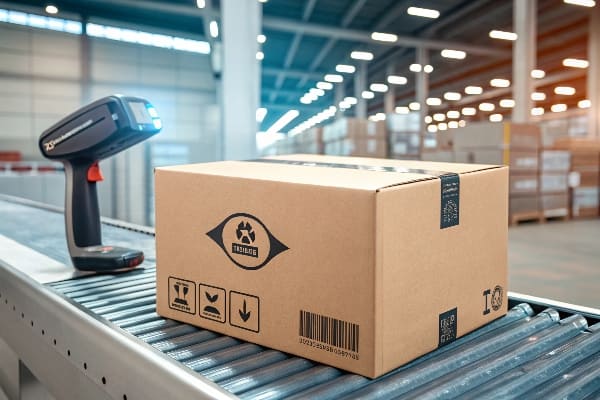
Branding without damage or risk
I print bold graphics on many transit cartons. Carriers accept logos if labels are clear and barcodes scan. I keep shipping marks readable. I avoid glossy varnish over label zones to keep adhesive grip. For high-value items, I reduce overt branding and use tamper-evident tape7. I place the shipping label on a plain panel. For outdoor gear, like crossbows or optics, I use neutral descriptors on the box and a strong inner display that reveals the brand at retail. This balances theft risk and shelf impact. In Europe, buyers ask for eco logos and fiber certifications. I add FSC and recycling cues8 near the tear strip. In the U.S. and Canada, I keep litho-lam vibrant but durable. I run rub tests so inks do not smear under conveyor friction. Good branding does not fight logistics. It guides handlers and delights shoppers at opening.
| Topic | Good Practice | Why |
|---|---|---|
| Label zone | Matte area, no varnish | Better adhesion and scan |
| Security | Tamper tape, neutral text | Deters theft |
| Eco marks | FSC, recycling icons | Meets buyer policy |
| Finish | Rub-resistant inks | Survive conveyors |
Conclusion
You can ship in display-style boxes if you design for strength, closure, and cushions. One box can protect in transit and sell on shelf when you apply simple rules.
Understanding board rating is crucial for ensuring your packaging can withstand stacking and side crush, protecting your products. ↩
Exploring closure options helps prevent seam failure, ensuring your packages remain secure during transit. ↩
Explore how custom display boxes can enhance product visibility and protect goods during transit. ↩
Learn about the importance of sustainability in packaging and how it influences consumer choices. ↩
Exploring the benefits of reuse can help you understand its impact on sustainability and cost savings. ↩
Learning about shipping-grade cartons can enhance your knowledge of packaging standards and improve your shipping practices. ↩
Explore this link to understand how tamper-evident tape enhances security and protects high-value shipments. ↩
Learn about FSC and recycling cues to see how they can improve your brand’s eco-friendliness and appeal to conscious consumers. ↩

